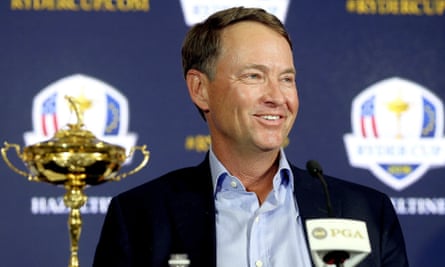For all that the Ryder Cup involves two sides, it is difficult to deviate from the notion that the narrative of this, the 41st playing of the event, focuses mainly on one.
The desire of the United States to end a dismal run against Europe has taken them from one luminary, Tom Watson, to a taskforce and renaissance man in the form of Davis Love III. The US wildcard process has been modified, Tiger Woods has completed a journey of full circle from Ryder Cup indifference to the heart of the backroom team and an already fevered scenario has been ramped up even further. One is left to wonder what on earth the Americans will do if they have not wrestled back the Ryder Cup when time is called at Hazeltine next Sunday. Abandon all hope, perhaps.
US favouritism may be merited on the basis they have, on paper, the stronger team. They are also at home, but determination can become desperation pretty easily and to a team’s detriment. The involvement of Woods and Phil Mickelson may present Love with an issue over strong personalities above whom he should, in theory, exert authority. One glance at US preparations reveals a seriousness that has so often proved their undoing.
The Europeans have no need whatsoever to modify a team approach that has returned the Ryder Cup three times in succession. In Rory McIlroy, Justin Rose, Henrik Stenson, Martin Kaymer and Sergio García they have a formidable backbone. Lee Westwood would cherish celebrating his 10th appearance with yet another win. For all the fresh-faced nature of the European contingent has been heavily played upon, there is a natural team evolution that need not necessarily be harmful. One of Darren Clarke’s rookies, Danny Willett, is the Masters champion.
“It’s unquestionable that it’s going to be a very, very big task ahead of us,” Clarke said. “Davis’s team is also shaping up very, very strongly. But with this team, those guys have earned their right to be on the team. They have embraced the challenge. They have got on there and they are world-class players in their own right.
“With adding Thomas Pieters to that list, there are six rookies there, but with the talent that they all possess, I’ve got no worries at all about the strength of that team going to America. I’m proud of that team. It’s a team that’s going to go there and do everything we possibly can to bring that trophy back home again.”
The fearsome length of Hazeltine – it can stretch to 7,600 yards – will only have been intensified by the deluge of rain that has battered that corner of Minnesota in recent days. Still, it would be curious if Love insisted upon the venue playing at its full distance. A slog fest appeals to nobody; birdie and eagle putts to win holes provide enduring Ryder Cup memories.

“If we don’t win, if Europe doesn’t win, Darren and I are going to have a lot of explaining to do,” said Love. “That’s part of it. But we’re used to the pressure. We’re used to wins and losses. One thing [the sport psychologist] Bob Rotella told me: if you’re going to base your happiness on winning and losing, golf is not a good sport to be in because you’re going to lose a lot. Tiger Woods has won more than anybody but he’s lost a lot of tournaments.
“But we enjoy the challenge and we love being on the stage and you’ve got to take the wins with the losses. I certainly hope that these 12 guys understand that this is their team. It’s not about me. I’m not playing. Tiger Woods is not playing.”
Mickelson is and, coincidentally, the USA’s horror shows have matched the left-hander’s involvement. Mickelson first featured in the Ryder Cup of 1995; in 10 appearances, the USA has won twice. Two years ago Mickelson’s public trashing of Watson provided an epic Gleneagles denouement. But here is the crunch; having been so outspoken and taken on increased prominence thereafter, Mickelson has a pressure of his own to deliver.
Since announcing his captain’s picks in late August, Clarke has been absent from the public eye. A perfectionist to the point of obsession on occasion – there is no chance whatsoever of a Medinah/Rory McIlroy-esque timing issue at Hazeltine – Clarke will leave nothing to chance. By his own admission, though, the challenge is a formidable one, not least because the next European captain who does not continue a run of glory will automatically be criticised.
There is logic behind bookmakers having a fancy for the US. There is considerably more in the sense that such an outcome would benefit the Ryder Cup as a whole. Nonetheless, recent history has served valuable lessons; they all intensify focus on Love and his players. Three intense days will tell whether or not Europe can quietly benefit from that.
